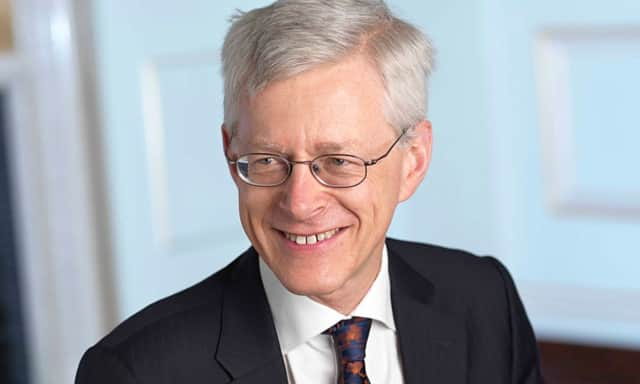Surge in wage growth adds pressure for BoE rate rise


The central bank also said yesterday that inflation – which measured just 0.1 per cent last month – is likely to pick up “notably” over the coming months as the effects of lower energy prices fall out of its calculations.
Minutes from the Bank of England’s monetary policy committee (MPC) showed that its nine members voted unanimously to keep interest rates on hold at the record low of 0.5 per cent earlier this month, as the consumer prices index remains well below the 2 per cent target.
Advertisement
Hide AdAdvertisement
Hide AdHowever, for two of the MPC’s members – believed to be Ian McCafferty and fellow hawk Martin Weale, pictured – the decision surrounding borrowing costs was “finely balanced between voting to hold or raise base rate”. The minutes came as the Office for National Statistics (ONS) revealed that wage rises have reached their highest rate for nearly four years.
Total pay in the three months to April climbed by 2.7 per cent compared with the same period a year earlier – the biggest rise since August 2011 and up from 2.3 per cent in the three months to March.
Ultra-low inflation, which fell to minus 0.1 per cent in April, means the surge in pay is worth more in real terms. Growth in real wages, at 2.8 per cent, is the highest since October 2007.
Meanwhile, the ONS figures showed unemployment fell by 43,000 to 1.81 million in the three months to April compared to the prior three months, while the jobless rate dipped from 5.7 to 5.5 per cent. In Scotland, the unemployment rate stands at 5.9 per cent.
Chris Williamson, chief economist at financial data company Markit, said: “Some policymakers will therefore be getting increasingly twitchy trigger fingers given the encouraging news on pay growth, and a chance of a rate hike this year has risen substantially. If the pace of economic growth revives, as widely expected, the recent upturn in pay takes away the main remaining argument to hold off with raising interest rates, and pressure to tighten policy looks set to build significantly as we move into the second half of the year.”
The UK economy expanded by 0.3 per cent in the first quarter – half the rate seen in the final three months of 2014 – and the Bank of England predicts that growth will return to 0.6 per cent in the second quarter, “a little weaker than previously expected”. Brenda Kelly, head analyst at London Capital Group, said: “While downside risks from a potential ‘Grexit’ are considered significant, wage growth appears to be on the right track and unemployment remains stable.
“Most notably, the central bank stated that its policy path would not be set by other central banks. Markets are now pricing in a 63 per cent probability of a rate hike within the next three months.”